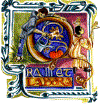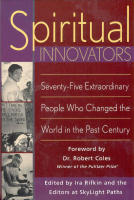| Fragrance of a Rose |
 |
|
The disciples were absorbed in a discussion of Lao-tsu's dictum: "Those
who know do not say; those who say do not know."
When the Master entered, they asked him what the words meant. Said the
Master, "Which of you knows the fragrance of a rose?"
All of them knew. Then he said, "Put it into words."
All of them were silent. |
|
What is spirituality? To have the answer is to have misunderstood the question.
Truth, wisdom, goodness, beauty, the fragrance of a rose - all resemble
spirituality in that they are intangible, ineffable realities. We may know
them, but we can never grasp them with our hands or with our words. These
entities have neither color nor texture; they cannot be gauged in inches
or ounces or degrees; they do not make a noise to be measured in decibels;
they have no distinct feel as do silk, wood or cement; they give no odor,
they have no taste, they occupy no space.
And yet they exist; they are. Love exists, evil exists, beauty exists,
spirituality exists. These are the realities that have always been recognized
as defining human existence. We do not define them, they define us. When
we attempt to "define" spirituality, we discover not its limits,
but our own. Similarly, we cannot prove such realities - it is truer to
say that they "prove" us, in the sense that it is against them
that we measure our human BE-ing: the act and the process by which we exist.
Life is not what we "have," or even what we "do", connected
as these may be: we what and how and who we ARE, and BE-ing is a real activity.
Like "love," spirituality is a WAY that we "be".
This way of BE-ing defires definition and delineation; we cannot tie it
up, in any way package it or enclose it. Elusive in the sense that it cannot
be "pinned down," spirituality slips under and soars over efforts
to capture it. to fence it in with words. Centuries of thought confirm
that mere words can never induce the experience of spirituality. |
| Photo by Jan Ober of TFF Story and Comment - Excerpt from "The Spirituality of Imperfection",
Kurtz & Ketchum) |
|
 |
Meaning is one of those overview terms that seems to sum up the spiritual life.
Many people, in fact, define spirituality as the search for meaning and
purpose. But this is also a specific practice that can be learned, developed,
and applied. It involves both seeking and making. Seek meaning by looking
for the big picture encompassing your experiences. Watch for patterns in
the world and in your own behavior. Make meanings by attaching analogies,
metaphors, symbols, and stories to things and events. See what messages
come to you when you regard them in this way. Expose yourself to the various
values assigned to everyday life by the popular culture, philosophy, and
the world religions. Learn more about how you can understand things. Take
a course. Go to a lecture. Listen to a tape.
|
 |
Spirituality of Aging. People of all ages often seek to find meaning in their everyday activities.
Understanding the relationship as well as the differences between spirituality
and religion may explain and support the interest of older adults in reaching
beyond themselves, doing and caring for others, and disinterest in
the material. Defining spirituality, identifying its threats and strategies
may lead readers into incorporating spirituality into or finding meaning
in their lives. Expressions of spirituality through religious practice
or compassion, service to others or passing on wisdom to succeeding generations
(generativity) often bring deep personal satisfaction, comfort, and peace
to older adults and thus help them mature more successfully. |
|
| Dictionary |
Spirituality (Spir`it*u*al"i*ty) (?), n.; pl. Spiritualities (#).
[L. spiritualitas: cf. F. spiritualité.]
1. The quality or state of being spiritual; incorporeality; heavenly-mindedness.
"A pleasure made for the soul, suitable to its spirituality." South. "If this light be not spiritual, yet it approacheth nearest to spirituality." Sir W. Raleigh. "Much of our spirituality and comfort in public worship depends on the state of mind in which we
come." Bickersteth.
2. (Eccl.) That which belongs to the church, or to a person as an ecclesiastic,
or to religion, as distinct from temporalities. "During the vacancy
of a see, the archbishop is guardian of the spiritualities thereof." Blackstone.
3. An ecclesiastical body; the whole body of the clergy, as distinct from,
or opposed to, the temporality. [Obs.] "Five entire subsidies were granted to the king by the spirituality." Fuller. |
A Healing
Definition
from
St. Luke's
Hospital
in
Houston
Texas. |
| St. Luke's Episcopal Health Charities (SLEHC) is deeply interested in how
spirituality contributes to individual and community health. The Charities
enthusiastically embraced the challenge to define this elusive concept
and has incorporated its meaning into all we do, as shown by our credo:
Advancing Community Health: Body, Mind and Spirit - Definition of Spirituality. We recognize each person as a child of God and believe that through grace
and the gifts of body, mind and spirit, each person has the potential for
wholeness --- a unique combination of physical, mental, and spiritual health
that makes possible: A sense of meaning and purpose; Loving relationships
with others; and Responsible actions. The Charities also seeks to enhance
community health status in mind, body, and spirit through programs and
partnerships with faith organizations (churches and other community health
and/or human service organizations). |
|
 |
Monastic Spirituality - from The Monastery of Christ in the Desert, New Mexico. Defying a simple definition, Christian monastic spirituality is primarily
an approach to God in response to God's invitation found in Sacred Scripture:
"Seek first the Kingdom of God" (Mt 6:33). Monastic spirituality
implies a single-heart (solitary) seeking of God. This may or may not be
carried out in the company of others, (the monastic tradition has embraced
both), but the focus is clearly on returning to God, and making use of certain specific practices: prayer, fastings, silence,
vigils, reading, good works |
|
|
|
|
|


